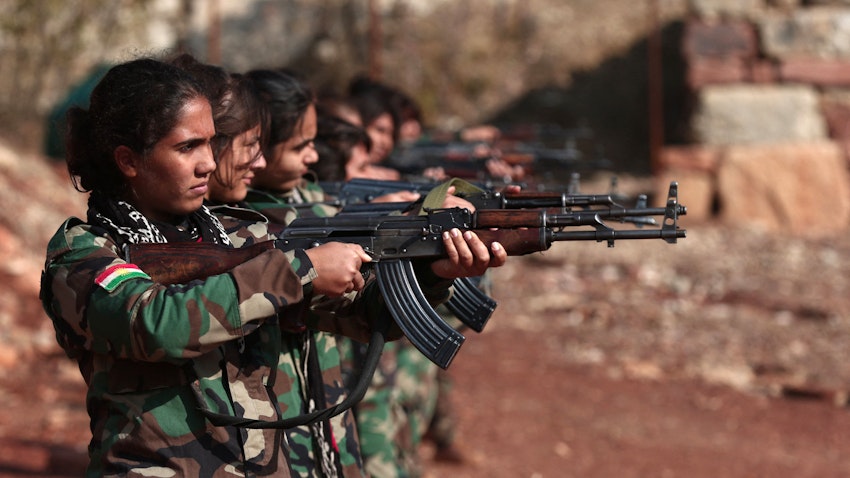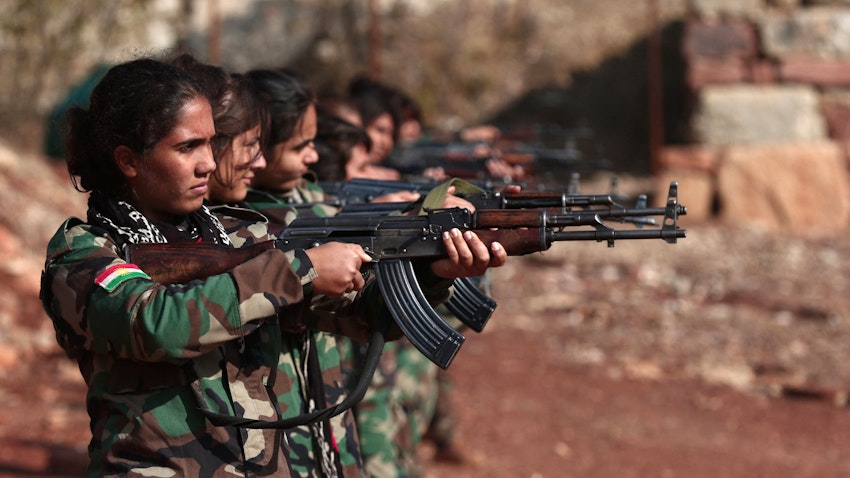Inside story: Iran-Iraq security accord set to up pressure on Iranian Kurds
Apr. 6, 2023Mustafa Saadoon

Female Kurdish Peshmerga fighters affiliated with Iran's seperatist Kurdistan Freedom Party take aim at a base in Erbil, Kurdistan Region of Iraq on Dec. 1, 2022. (Photo via Getty Images)
The secretary of Iran’s Supreme National Security Council (SNSC), Ali Shamkhani, recently visited Baghdad, where he met with top officials including Iraqi Prime Minister Muhammad Shia’ Al-Sudani. The trip particularly gained attention as it followed Shamkhani’s secret negotiations with Saudi officials in China, where the two sides on Mar. 10 announced that they had agreed to resume diplomatic relations.
The accord in Beijing notably came in the wake of five rounds of talks between Iranian and Saudi delegations in Baghdad between 2021 and 2022. Another dimension to Shamkhani’s visit to Iraq was his trip to the United Arab Emirates after the China talks, indicating that he has been tasked with leading Iran’s engagement with Arab regional states.
Intentional obfuscation?
During the Mar. 19 visit to Baghdad, Shamkhani signed a security agreement with his Iraqi counterpart, National Security Advisor Qasim Al-Araji, overseen by Sudani. A statement published by the Iraqi prime minister’s office later noted that the agreement addresses “coordination to [jointly] protect the common borders between the two states and enhance cooperation in several security fields.”
Media attributed statements to both the Iranian and Iraqi sides that were neither clear nor comprehensible. Some reports stated that “an agreement was inked between the two countries,” while others described the signed document as a “security memorandum.”
This confusion appears to have been a deliberate effort by the governments in Baghdad and Tehran. The seemingly intentional ambiguity indicates that while the two sides likely did not see eye to eye on several issues, they homed in on one shared concern within the discursive parameter of “protecting the common borders between the two states.”
Main Iran-Iraq border crossings
There are multiple official crossings between the two neighbors, stretching from the north to the very south of the frontier.Speaking on condition of anonymity, a senior Iraqi security source in charge of the Iran-Iraq border dossier told Amwaj.media, “The agreement between Iraq and Iran is indeed relevant to safeguarding the borders and preventing smuggling between the two states.” He elaborated, “However, it also goes beyond that and will help pursue the armed Iranian opposition in Iraqi Kurdistan or curb its activities.”
An opportunity for Sudani
Armed Iranian Kurdish groups opposed to the Islamic Republic have long been active in the Kurdistan region of Iraq, where they have set up training camps. The main factions include the Democratic Party of Iranian Kurdistan (PDKI), Free Life Party of Kurdistan (PJAK), Komala and the Kurdistan Freedom Party (PAK).
Some of the groups occasionally launch attacks inside Iran. The factions also have offices in Erbil, through which they engage in political activity. Iranian officials regularly accuse the Kurdish opposition of “terrorist” activities and collaboration with Israel. In addition, Tehran has also claimed that dissidents based across the border have incited unrest in Kurdish-populated areas of Iran in recent months.
In the wake of suspected Israeli attacks inside Iran and anti-establishment protests in Iranian Kurdistan, the Islamic Revolutionary Guard Corps (IRGC) has in past months launched large-scale attacks against targets in Iraq. On repeated occasions, the IRGC has bombarded camps using both ballistic missiles and drones, despite criticism from the Kurdistan Regional Government (KRG). Some other political groups in Iraq have also rejected the Iranian attacks as a violation of Iraq’s sovereignty.
IRGC attacks on Iraqi Kurdistan, 2022
The Sudani-led government is benefiting from Tehran’s targeting of Iranian Kurdish opposition groups. This is since the Iranian strikes have seemingly paved the way for measures that Baghdad would otherwise have probably needed years to achieve.
For example, the federal government has this year reinforced its deployment of border guards along Iraqi Kurdistan’s borders with Iran and Turkey. Previously, the task of border control had primarily been the responsibility of the KRG-affiliated Kurdish Peshmerga forces.
High-level coordination
About a month after taking office last October, Prime Minister Sudani embarked on a visit to Tehran, where he met with top officials including Supreme Leader Ayatollah Ali Khamenei. Part of Sudani’s conversation with Khamenei revolved around the need for Baghdad to counter the threats to Iran from Iranian Kurdish opposition groups based in northern Iraq. Sudani reportedly stated, “Per the Iraqi constitution, we will not allow any party to use Iraqi territory [as a launchpad] to destabilize Iran’s security.” Khamenei answered, “Unfortunately, this is happening in some regions of Iraq, and the only solution is that the central government in Iraq establish its control over those regions as well.”
Addressing the apparent consensus on the need to establish central government authority over border areas, a senior Iraqi security official who spoke to Amwaj.media on condition of anonymity stated, “Iran has helped Iraq with advancing in that direction.” According to the security source, part of the pressure on Baghdad to control the Kurdistan region’s border with Iran “is aimed at giving the Sudani-led government influence inside Iraqi Kurdistan, which Iran says harbors headquarters for the Israeli Mossad.”
Iranian missiles rock Iraqi Kurdistan
Iran hit the Erbil home of a Kurdish oil tycoon on Mar. 13, 2022, calling it an Israeli "strategic center." Most crude exports from Iraqi Kurdistan reportedly end up in Israel via Turkey's Ceyhan port.Baghdad will now work with the United Nations to eliminate any threat to Iranian border districts posed by the KDPI. One measure will be to find a new camp for the Iranian Kurdish opposition group, likely away from the border. This in itself will give Baghdad more influence on the ground in the Kurdistan region.
The Sudani administration has also dispatched reinforcements to the border forces stationed along Iraqi Kurdistan’s frontiers with Iran and Turkey. In an interview with Saudi-owned media earlier this year, Iraqi Interior Minister Abdul Amir Al-Shammari stated that Baghdad would dispatch further forces and has already begun setting up outposts and watchtowers at the very edge of Iraq’s borders.
The underlying dynamics
The Iraqi government has not disclosed details of the security accord signed with Iran, apart from the reference to an understanding on “securing the common borders between the two countries.” However, given the state of confusion among media outlets in both countries, it seems that there may be commitments that Baghdad must fulfil while Tehran likely does not face any obligations in return.
Speaking on condition of anonymity given the sensitivity of the matter, informed sources in Iraq have alleged that Shamkhani mainly focused on the need for Baghdad to work on ending or limiting the activities of Iranian opposition parties based in the Kurdistan region. The sources also indicated that the major Iranian support for the Sudani government could be related to the prime minister’s measures and public stances on opposition groups active in northern Iraq.
The bigger picture is that the presence and activities of Iranian Kurdish opposition factions are a source of embarrassment for the Sudani government in front of Tehran, while Erbil is left embarrassed before both Baghdad and Tehran. Accordingly, an informed Kurdish source alleged to Amwaj.media, there has been a commitment by the KDPI to Erbil—albeit not an agreement—over the need for the Iranian Kurdish group to halt any armed activity. Importantly, the source elaborated that the latter “was a condition to halt the Iranian airstrikes on the Kurdistan region,” which has been a key aim for the KRG.
Distribution of power in Iraqi Kurdistan
The Kurdistan Democratic Party (KDP) and the Patriotic Union of Kurdistan (PUK) maintain separate zones of control.For now, the future of the Iranian Kurdish opposition groups based in Iraq remains unclear. Iran could work towards a fate for them similar to that of the Mojahedin-e Khalq Organization (MEK). The last members of the exiled Iranian opposition group—which first took refuge in Iraq under former president Saddam Hussein (1979-2003) and fought on his side during the 1980-88 Iran-Iraq War—left the country in 2016.
Speaking on condition of anonymity, an informed source in the Iraqi prime minister’s office told Amwaj.media, “Sudani does not want [IRGC] bombardments to occur during his tenure and aspires to ensure that this persists after he leaves office. He plans to stop any military activity by Iranian opposition groups based in the Kurdistan region of Iraq; however, this is not easy to achieve. Maintaining an equilibrium on such issues is very hard.”
As for the KRG, it is incapable of wholly limiting the activities of Iranian Kurds on territory it controls, nor is it capable of stopping IRGC attacks. Erbil is thus expected to allow Baghdad to expand its influence in Iraqi Kurdistan, and for the heightened presence of federal forces to counter the Iranian threats and cross-border attacks.
All in all, the Sudani administration stands before a great opportunity that both circumstances and Iran have brought its way. It is now capable of expanding its presence and control over ground zero points along Iraq’s borders with Iran and Turkey—a major shift that would re-establish central government authority over areas that for years had been turfs of KRG-affiliated Kurdish Peshmerga. To the prime minister’s supporters in both Baghdad and Tehran, this is a major victory.

Inside story: Iran-Iraq security accord set to up pressure on Iranian Kurds
The secretary of Iran’s Supreme National Security Council (SNSC), Ali Shamkhani, recently visited Baghdad, where he met with top officials including Iraqi Prime Minister Muhammad Shia’ Al-Sudani. The trip particularly gained attention as it followed Shamkhani’s secret negotiations with Saudi...


